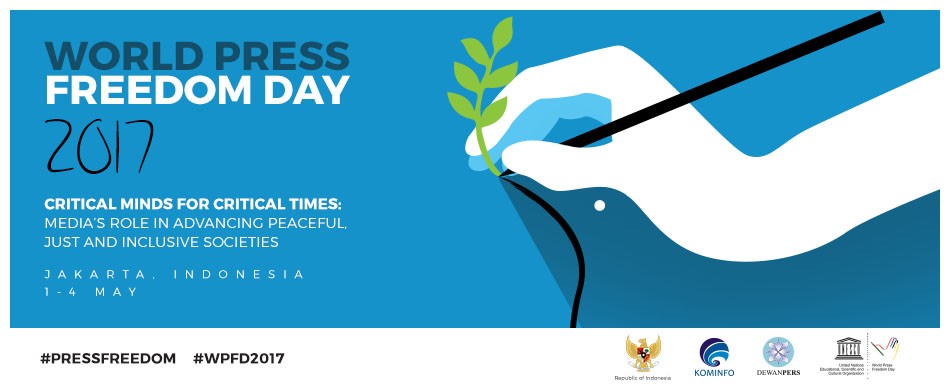Written by Naja Bentzen, Velina Lilyanova, Philippe Perchoc, Martin Russell, with Clare Ferguson
 Each year, on 3 May, UNESCO reminds the world of the importance of press freedom to creating peaceful societies which value justice and human rights. This year’s World Press Freedom Day takes the theme of ‘Critical Minds for Critical Times’, underlining the growing role of misinformation campaigns and ‘fake news’ in today’s global political landscape. While UNESCO highlights the fundamental principles of press freedom around the world, and the challenge to democracy posed by attacks on the media and journalists themselves, the EU also acts to support media freedom, particularly in its Eastern neighbourhood.
Each year, on 3 May, UNESCO reminds the world of the importance of press freedom to creating peaceful societies which value justice and human rights. This year’s World Press Freedom Day takes the theme of ‘Critical Minds for Critical Times’, underlining the growing role of misinformation campaigns and ‘fake news’ in today’s global political landscape. While UNESCO highlights the fundamental principles of press freedom around the world, and the challenge to democracy posed by attacks on the media and journalists themselves, the EU also acts to support media freedom, particularly in its Eastern neighbourhood.
See also our topical digest on:
‘Truth, the media and the public sphere‘
Following the failed military coup of July 2016, media freedom in Turkey has deteriorated dramatically. The Organisation for Security and Cooperation in Europe, the European Union and the Council of Europe have all raised concerns regarding the number of media workers imprisoned. The European Parliament condemns the rising number of arrests of journalists, and is concerned by the ‘backsliding in democratic reforms, and in particular the government’s diminishing tolerance of public protest and critical media’. Of the 130 journalists, media workers and writers arrested following the coup, only 64 have been released. Calling for the immediate release of journalists held without proof of criminal activity, Parliament also notes that journalists are detained in deplorable conditions, and that the closure of many media outlets leaves many out of work. The Turkish government’s repressive measures have led Parliament to request that ‘the Commission and the Member States … initiate a temporary freeze of the ongoing [EU] accession negotiations with Turkey’.

Media freedom is a core EU value and a cornerstone of democracy, and thus a priority reform area in the Western Balkans’ EU accession agenda. Nevertheless, in spite of a certain level of preparedness and a broadly developed legal framework, media freedom in Albania, Bosnia and Herzegovina (BiH), the former Yugoslav Republic of Macedonia, Montenegro, Serbia and Kosovo continues to face systemic shortcomings that require long-term sustained efforts. These efforts have stalled in recent years. Transition to media freedom in the region remains incomplete and ‘no progress’ has been made in improving the overall environment. Intimidation of journalists continues, and the political grip on public broadcasting is matched by the opacity of funding in private media. As media freedom is an enlargement priority, Parliament is increasingly concerned by the lack of progress on media freedom in the Western Balkans.
Media freedom also has high priority in the EU’s political dialogue with the six Eastern Partnership countries. Since the 2015 Eastern Partnership Media Conference, media freedom has seen limited changes in these countries. While Ukraine has made progress, for example, Moldova has slipped in the international media freedom rankings – and the Kremlin’s increasing information activities present a difficult challenge to media freedom policies. The EU East StratCom Task Force publishes a weekly newsletter exposing disinformation published in Russia and elsewhere by pro-Kremlin media. The task force also produces a Russian-language website with information and infographics on the EU targeted at readers in Russia and neighbouring countries.
In Russia itself, the state controls strategic media (such as national TV) and restricts independent media and the internet through increasingly repressive legislation. However, scope for media pluralism remains, with a few outlets openly criticising the authorities. Current tensions between the EU and Russia make direct EU support for Russian media difficult. Recent financial support within Russia has been limited to two projects, funded by the European Instrument for Democracy and Human Rights. The EU also provides regular seminars for Russian journalists explaining the priorities of each new Council presidency. Some EU funding for independent media is also channelled through the European Endowment for Democracy.
Sustainable changes in media freedom do not happen overnight. But beneath the surface, EU-funded projects and programmes are contributing to changing media landscapes. The European Parliament consistently promotes and supporting freedom of the press and freedom of expression in its Eastern neighbourhood.








Be the first to write a comment.